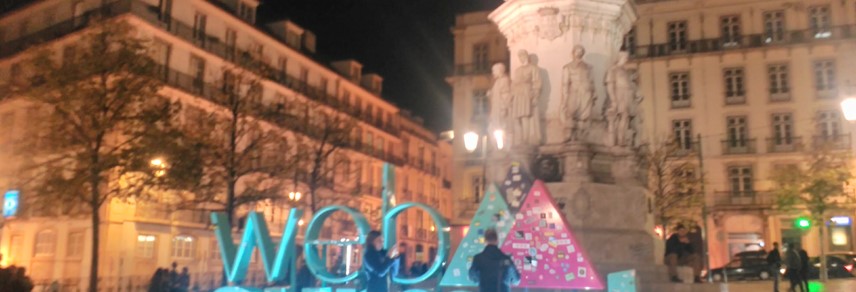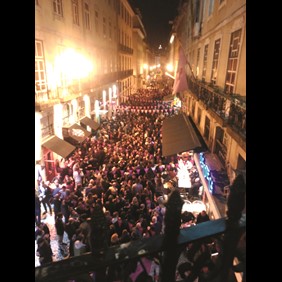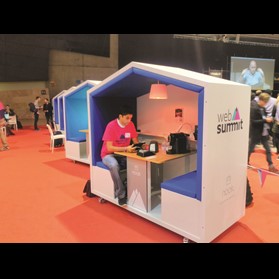
SUMMIT OF SUCCESS
At this year’s Lisbon Web Summit, Hubert Grealish, founder of GWorks, reports on AI, digital change and communications through uncertain political times. What were the highlights of the global digital communications event?
The Web Summit, as in the formerly-known-as-Dublin-Web-Summit, has successfully launched in Lisbon to great local and international fanfare. It was a monumental success for the city and country, bringing an estimated economic injection of around €200m+ in spend, not to mention new Portuguese business opportunities stemming from its success. The good folk of Lisbon embraced the throngs of suits and cases as they flooded the streets for the now renowned Night Summits. The city handled the 53,000 visitors without issue and the summit’s main stage became the mantlepiece for global tech spokespeople to lean on. Even the Vatican had it’s digital envoy on stage to talk of the changing roles of technology and the internet in an increasingly complex world.
In these times of mass media, marketing and the proverbial message, it shows the power and influence of ‘showing up’ to Web Summit, now in its sixth year. To those physically up to bolting from talk to talk, there was much to see, yet impossible to capture and track all the talks, for the dozen or more simultaneous presentations, pitches and panels run alongside each other.
Web Summit is like an MBA in e-business in but a few short days; exhausting but fulfilling. Yet, for the 53,000 at the Web Summit, showing up is the greater part of success, with serendipity playing its ever-present role at an event like this.
Upon arrival at Lisbon, there was a brilliant welcome with free wifi at the airport, with the links to download the event app directly. One US tech company founder who arrived via London said he was travelling to Lisbon via ‘Brexistan’, seeking ways to now bridge out of the United Kingdom. He said this was the only way to risk limiting the digital business to but one bloc, but the Brexit vote defeated his ‘open-in-Europe’ aspirations for UK business. There is now much interest, at least passively, in the prospects of what Lisbon can offer. Especially after some degree of controversy leaving its original home of Dublin, where remains the Web Summit's HQ.
Opening WebSummit, Antonio Costa, Portugal’s prime minister, announced the government’s plan to invest €200m in local startups as well as to lure internationals to set up there. To a strained economy this is a major commitment, one which needs to be made, the nature of ‘startup’ being ‘hope' in itself. Hope, yes, though innovation certainly when fostering startup culture. While it is far behind that of Dublin or other European capitals in terms of inwards investment, Lisbon has the low rent and close proximity to other cities to give it an edge, creating potential to become a more prominent place for business. Especially for startups and the hordes of increasingly mobile, freelance and self-styled workers populating the digital communications industry today.
At Monday evening’s Digital Nomads dinner, which i co-hosted, there was a great sense of occasion to annual events that's Web Summit. The informal networks that arise through are often where real cracking ideas and cracking relations are fused.
At the venue, the bulk of serious foot-fall happens between the many stages and panel areas, the majority of actual networking and celebrating taking place each night on one of the two streets specially reserved to entertain the hordes after dark. A jovial atmosphere ensuing of course, at all times. Even the US SXSW contingent had a party of its own, to lure folk west to its own unique event in March 2017. If you can't beat them, join them?
The Night Summit as it's known is itself sort of friendly football flow of folk, but for tech talk and fun. To the tens of thousands around, the famous Portuguese hospitality represented well, surely never tested in this way before.
Even non-tech firms have a place there, like Moo.com with its full stand to promote ye olde business cards. Bustling too. Bristol-based movable meeting pod firm Nook.do found there was much interest in its phone-charging, cosy hubs, where media, investors and delegates could grab a few minutes privacy without leaving the view of the open floor. Some journalists found them useful for their briefings as well.
 |
 |
Stephen Carroll, business editor at France 24 said, “The Nook pods allowed us to get quiet focused time with very busy individuals in an otherwise extremely noisy and active environment.” A view echoed by other media as the units provided a quieter ‘Nook village’ to get a few mins work done, or have a meeting. CEO and designer David O’Coimin says he was inundated at the Web Summit with queries of further interest, as agencies seek to spruce up their offices and one-to-one meeting zones. Yet, he was surprised some of the media popped in to use them as well for briefings. “It’s been very cool for me to have the CEO of Renault Nissan Alliance being interviewed by French TV in the Nook,” said O’Coimin.
Despite more communications and networking heading online, events still have a role to play. They create the necessary sense of energy and occasion as attendees and business leaders experience the unique opportunity to meet and share congress. Web Summit's organisers swiftly recognising this years ago from their student house in Dublin, from where they set out plans for a modest Dublin Web Summit, hoping to excite and inspire the industry.
Before then, how many self-styled ‘leaders’ of any type had been to a summit? The language employed by the Web Summit is focused on value, prestige and presence, though I doubt even its founders could have foreseen just how much the tech industry has taken that to heart. And surely there’s more to come with the summit promised to Lisbon for at least another two years.
The Web Summit now has such a strong brand, it is country agnostic and free to roam anywhere it may choose. As with the other events run by Web Summit – Rise in Hong Kong, Collision in Las Vegas and others – there will be more stages and events for these increasingly global ‘mega meetups.’
Then there’s the fearful edge of artificial intelligence. Still in it’s infancy, yet of great interest and focus. Jury still being out, though attentions continuing to mount.
Normally we communicators don’t readily know how to define such AI talks, though there were some amazing innovations to see in this space. The rate of innovation in chatbots, AI and machine learning will accelerate now. The digital industry is gushing resources into it at the same time as some of the world’s greatest thinkers – the likes of Elon Musk and Stephen Hawking – are too.
But the rise of AI will have implications on human communications as well, of course. According to David Marcus, Facebook’s vice president of messaging, adding a chatbot to a brand or company page will increase engagement threefold. That’s without any added human resource on the company side. Though the reality, at least currently, does not reflect that benefit. Many users cite spam on Facebook’s newsfeed and have tired of its forced Messenger talk.
In the near future, people will be able to tweet or message their thoughts, without a phone or a keyboard. But the world didn’t need technology to gauge the shocked reaction to the US presidential election, right in the middle of the Web Summit.
Dave McClure of 500Startups’ outspoken and emotional call to ‘stand up’ to Donald Trump was met with rousing applause and cheers. Despite all the buzz of the Web Summit, Trump was on everyone’s minds and everyone knew the world outside was changing. Tech seemed to be sidelined for moment, the consensus being to lean in more and use the existing tools to make the world better before things get any worse.
Katz Kiely, founder of BEEP, who presented on ‘people powered digital transformation,’ was optimistic. She says we have the required tools
to make change, “We just need to join the dots,” she said. The uncomfortable truth is clear that the unexpected turn of events was in many ways driven by technology. However, Kiely points out that the solutions are available as well to engage: connectivity, AI, behavioural psychology, and crucially, more affordable data and robotics can all help manage the explosion of conversations and engagements. This will be particularly relevant in times of turbulent or accelerating change, when hysteria or the collective mood may shift quickly.
Design is increasingly powerful, in conveying digital disciplines and value. “The future is always exciting, looking back and looking forwards is the magic,’’ said Miranda Willer of London-based visual design consultancy Pentagram, who spoke on the importance of design at the WebSummit.
The Lisbon Web Summit is massive. The 21 stages and talks mean it's go big or go home. For brands, the only way to cut through now is to go large and hit it big. The event has well and truly arrived globally now, showing it can mobilise to a new country with ease.
As with communications and product-market fit planning, to win at events like the Web Summit, brands need to hit some critical mass ahead of time; to bring up their values. By all means necessary. Get the product as tight as you can, hone the stories and put in the required leg work on and offline, every moment you can.
To the valid and increasingly pertinent innovations in mass-emotional context, as with SEED and its measuring of employee motivation and mood, companies will likely seek to please and appease with more AI and chatbot functionalities.
However, the most amusing and engaging tales and brand stories will ultimately remain human. Indeed at the summit, one startup lead described to another what exactly a ‘hustler’ is. “A kind of illegal guy or card player,” he said, reminding us that some events and things in life will always remain priceless.



